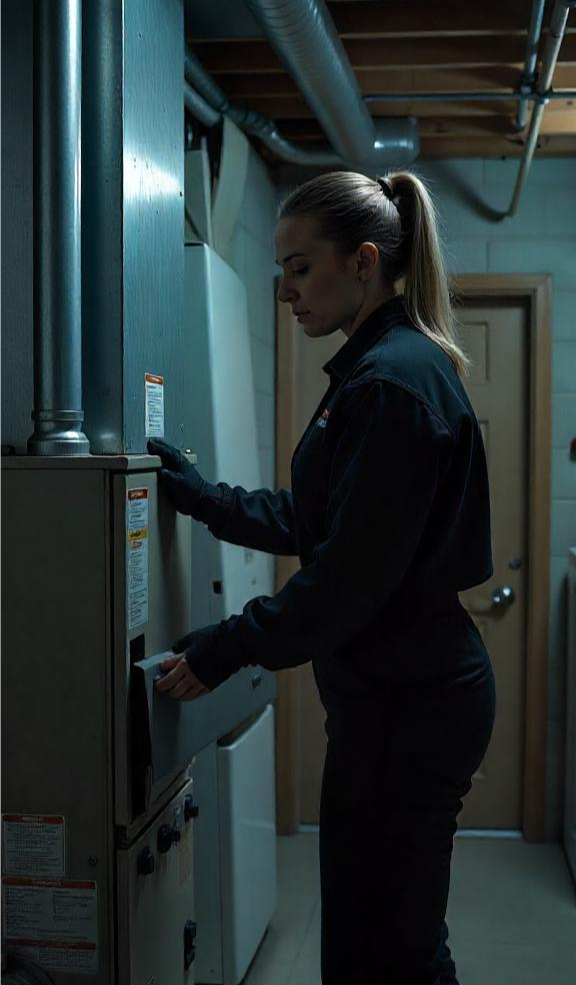Choosing the right size gas furnace for your home is critical to ensure optimal heating efficiency, comfort, and long-term savings. A furnace that is too small will struggle to heat your home effectively, while a furnace that is too large will cycle on and off too frequently, leading to higher energy costs and potential wear and tear. In this blog, we’ll explain how to determine the right size furnace for a 2000 sq ft house, what factors to consider, and how partnering with the right furnace installation contractor Concord can make a significant difference in your home’s heating system.
Understanding Furnace Sizing
Furnace sizing is measured in BTUs (British Thermal Units), which refers to the amount of heat required to raise the temperature of a given space. The size of the furnace you need depends on several factors, including your home’s square footage, insulation, climate, and more.
For a typical 2000 sq ft house, the size of the furnace you need will depend on the specific conditions in your home. Furnace installers Concord use a variety of methods, including the Manual J Load Calculation, to determine the precise furnace size required for your home.
Choosing the right contractor is just as important as selecting the right furnace. For a comprehensive resource, check out Finding The Best Furnace Contractors In Concord, CA: A Complete Guide.
 How to Calculate Furnace Size for 2000 sq ft House
How to Calculate Furnace Size for 2000 sq ft House
The general rule of thumb for heating a home is that you’ll need approximately 30-35 BTUs per square foot of living space in moderate climates. Based on this calculation, a 2000 sq ft home would require a furnace with a capacity of around 60,000 to 70,000 BTUs. However, this is a rough estimate, and factors like ceiling height, insulation, window quality, and the local climate must also be considered.
Key Factors That Affect Furnace Size
- Climate
The region where you live plays a significant role in furnace sizing. If you’re in a colder climate, such as Concord, CA, you’ll need a higher BTU rating to keep your home warm during the colder months. If you live in a milder climate, a furnace with a lower BTU rating may be sufficient. - Insulation
The quality and amount of insulation in your home will directly affect how much heating you need. Homes with good insulation retain heat more effectively, so you may need a smaller furnace. If your home is poorly insulated, a larger furnace may be necessary to compensate for heat loss. - Home Layout
Homes with high ceilings, open floor plans, or multiple levels may require a larger furnace to distribute heat evenly throughout the space. A furnace installation contractor Concord can evaluate the layout of your home and provide recommendations for the most efficient furnace size. - Number of Windows and Doors
Homes with many windows or drafty doors tend to lose more heat. If your home has large windows or is older, a furnace with a higher BTU rating might be necessary to maintain comfort.
Choosing the Right Furnace for Your Home
Once you have a rough idea of the furnace size needed, it’s important to choose the right furnace for your specific needs. There are several types of furnaces on the market, and each has its own advantages and disadvantages.
Types of Furnaces
- Single-Stage Furnaces
A single-stage furnace operates at full capacity when it’s on, providing a consistent level of heat throughout the house. While they are less expensive, they may not be as energy-efficient as other types of furnaces. - Two-Stage Furnaces
Two-stage furnaces offer more flexibility by running at two different capacities, providing a more consistent and energy-efficient heating cycle. These furnaces are ideal for homes with varying heating needs, especially larger homes like a 2000 sq ft house. - Modulating Furnaces
Modulating furnaces adjust their output based on the temperature needs of the home, offering the highest efficiency and consistent comfort. While they come at a higher upfront cost, they provide excellent energy savings over time.
Gas Furnace Efficiency
When selecting a gas furnace, it’s essential to consider its efficiency. The Annual Fuel Utilization Efficiency (AFUE) rating tells you how much of the fuel is converted into usable heat. The higher the AFUE rating, the more efficient the furnace is. Look for models with an AFUE rating of 90% or higher to ensure optimal efficiency and lower energy bills.
Professional Furnace Installation Matters
Choosing the right furnace for your 2000 sq ft house is only half the battle. Proper installation is just as important to ensure your furnace operates efficiently and safely. That’s where partnering with a trusted furnace installation contractor Concord comes in.
 Why You Need a Professional Furnace Installer
Why You Need a Professional Furnace Installer
Installing a furnace isn’t a DIY project. Incorrect installation can result in poor performance, increased energy costs, and potential safety hazards. A professional furnace installer Concord has the expertise to properly size, install, and configure your furnace, ensuring optimal performance.
Here are some reasons to hire a professional for your furnace installation:
- Proper sizing: An experienced contractor will ensure that your furnace is the right size for your home, avoiding the issues associated with an undersized or oversized furnace.
- Efficiency: A gas furnace installation contractor Concord can ensure that the unit is installed according to manufacturer specifications, optimizing efficiency and extending the lifespan of your furnace.
- Safety: Furnace installation involves working with gas lines, electrical systems, and ventilation. A licensed contractor has the expertise to ensure the installation is safe and meets all local codes.
- Warranty: Professional installation often comes with a warranty, offering you peace of mind knowing that your furnace will be covered if any issues arise.
For guidance on choosing the best contractor for your furnace installation, check out our article on Choosing a Gas Furnace Installation Contractor in Concord.
Replacing Your Heat Pump with a Furnace
If you’re considering replacing your heat pump with a furnace, it’s important to understand the differences between these two systems. Heat pumps are efficient for moderate climates, but a gas furnace might be a better option for homes in colder areas. A heating installation contractor Concord can help evaluate whether switching from a heat pump to a furnace is the right choice for your home.
Conclusion
Determining the correct size furnace for your 2000 sq ft home involves considering several factors, including climate, insulation, and home layout. By working with an experienced furnace installation contractor Concord, you can ensure that your furnace is properly sized and installed for optimal efficiency and comfort. If you’re ready to install a new furnace or need professional advice, call us for expert guidance.
📞 925-755-4440
💻 Schedule an Appointment


